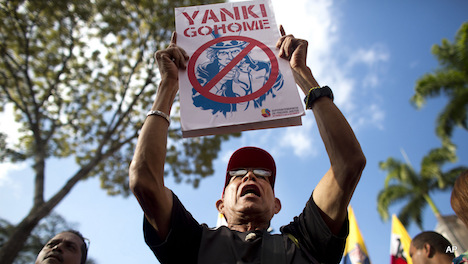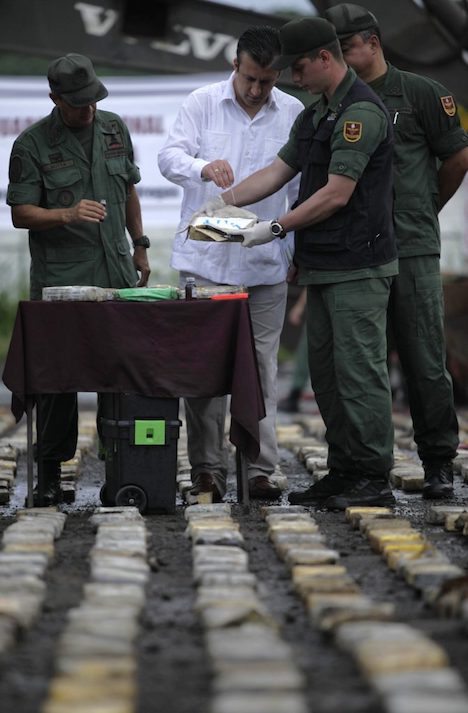The announcement of sanctions against Venezuela's vice president conveniently left out some revealing, and self-incriminating, details.
On Monday, the U.S. launched its latest diplomatic attack on Venezuela by officially putting Vice President Tareck El Aissami on a sanctions list reserved for “drug kingpins” without offering any evidence or issuing any criminal charges. Venezuela was quick to respond, with the Venezuelan Foreign Minister Delcy Rodriguez calling the move “lamentable and highly dangerous,” adding that her government “will not tolerate any aggression on our soil against our ability to be free.” For his part, El Aissami — who has vigorously and categorically denied the accusation — said the “miserable and vile aggression” was simply “an acknowledgment of (his) status as an anti-imperialist revolutionary.” As Venezuela contemplates its official response to the move, it’s important to review the background to this latest sanction. The Venezuelan investigative organization MisionVerdad unpacked some key contextual details the Department of Treasury conveniently left out in their announcement of the sanctions. 1. El Aissami Led Venezuela’s Successful War on Drugs While the U.S. Department of the Treasury officially designated El Aissami a “drug kingpin” they conveniently left out that under his tenure as head of Venezuela’s Department of the Interior, El Aissami led Venezuela’s own war on drugs, arresting 102 major drug traffickers, confiscating over 50 tons of illegal drugs bound for the U.S. and facilitating the extradition to the U.S. of 21 suspected drug traffickers. In perhaps the strangest detail, the Department of the Treasury accused El Aissami of having links to Colombian drug lord Daniel Barrera Barrera, the same man who El Aissami arrested and extradited to Colombia in 2012 to face drug trafficking charges. 2. Drug Seizures Increased After Venezuela Kicked out the DEA Indeed, Venezuela’s own “war on drugs” became much more successful after they kicked the U.S. Drug Enforcement Agency out of the country in 2005 on suspicion that the agency was more involved in spying on the Bolivarian revolution than taking on drug traffickers— a suspicion later confirmed in a 2014 investigation by The Intercept which showed “the DEA is actually one of the biggest spy operations there is.”
In the seven years after then-President Hugo Chavez ended cooperation with the DEA and put El Aissami in charge of counter-narcotics, drug seizures more than doubled relative to the final six years of anti-drug operations in cooperation with the DEA. Indeed the DEA itself praised the Chavez government’s efforts in a report saying that under his leadership, Venezuela “made progress in its overall counter-narcotics program. Seizures were high in all categories, thanks in large part to the implementation of several new programs.” MisionVerdad points to the fact that while El Aissami was added to the sanctions list of the Office of Foreign Assets Control in the name of the “War on Drugs,” that same list left off governments with long-standing proven connections to the drug trade, such as Paraguay, Peru, and Colombia, concluding that the OFAC is “clearly a geopolitical instrument.” 3. Trump, Tillerson, and China While totally overlooked by U.S. media, on the very day that the U.S. placed El Aissami on the sanctions list, Venezuela signed 22 economic development and cooperation agreements with China, another sworn enemy of U.S. president Donald Trump. While the timing may be simple coincidence, the growing economic ties between oil-rich Venezuela and the second-largest owner of U.S. foreign debt no doubt raised alarm bells among the U.S. foreign policy establishment. Most notable among that establishment is the newly installed Secretary of State Rex Tillerson, who as head of ExxonMobil took it “very personally” when his company lost billions in 2007 when then-president Chavez nationalized that company’s oil Venezuelan holdings, a move which was ruled legal in 2014 by the World Bank’s international arbitration court. Since his appointment was approved in January, Tillerson has spoken openly about regime change in Venezuela. 4. Triangulating Regime Change Just hours before the treasury department announced the sanctions, the White House released portions of a conversation between U.S. President Trump and Peruvian President Pedro Pablo Kuczynski in which the former said he was “concerned” about the situation in Venezuela. This public declaration came just one week after Senator Ben Cardin, the ranking Democrat on the Senate Foreign Relations Committee, introduced a resolution condemning Venezuela, calling for new elections, and supporting the virulently anti-Bolivarian president of the Organization of American States Luis Almagro’s attempts to expel Venezuela from the OAS. The analysis by MisionVerdad points out that these two moves come just one month after Venezuela’s right-wing MUD coalition cut off talks with the Maduro government, and instead announced an international tour by several of its key leaders to meet with legislators in Peru, Colombia and the U.S. 5. Continuing a Long (Nefarious) Tradition In responding to the announcement, former U.S. President Barack Obama’s top national security adviser on Latin America, Mark Feierstein, told The Guardian that the sanctions move “was an overdue step to ratchet up pressure on the Venezuelan regime.” Feierstein said that the move had been planned under the Obama administration yet put on hold during Vatican-sponsored talks between the Maduro government and the right-wing MUD opposition, which broke down last month after MUD representatives unilaterally walked away from the negotiations. MisionVerdad pointed out that Feierstein’s likely role in crafting the sanctions are particularly troubling given his long history of supporting regime change in Latin American. According to Mark Weisbrot, co-director of the Center for Economic and Policy Research, as a USAID project director in Nicaragua in the 1980’s Feierstein helped facilitate U.S. campaigns against the democratically-elected Sandinista government. While he was USAID director in Paraguay, The Nation reported that Feierstein increased funding to the institutions controlled by the right-wing factions which eventually led the parliamentary coup against leftist President Lugo in 2012. Indeed, in the conclusion of their analysis MisionVerdad suggested that the sanctions mark “the end of any speculation” that the anti-interventionist rhetoric spouted by Trump during his campaign might have signaled a break with the longstanding bipartisan U.S. policy of regime change. Source URL |

